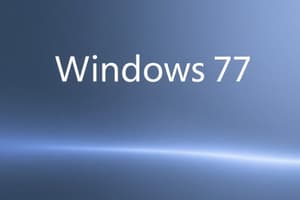Podcast
Questions and Answers
Which type of memory is NOT part of the memory hierarchy?
Which type of memory is NOT part of the memory hierarchy?
- Optical Memory (correct)
- Cache Memory
- Registers
- Primary Memory
What is the primary purpose of using word processing software?
What is the primary purpose of using word processing software?
- Analyzing data with formulas
- Creating and formatting documents (correct)
- Organizing databases
- Delivering professional presentations
Which of the following is NOT a type of computer?
Which of the following is NOT a type of computer?
- Super Computer
- Quantum Computer (correct)
- Mini Computer
- Micro Computer
Which feature would you expect to find in the 'Insert' tab of word processing software?
Which feature would you expect to find in the 'Insert' tab of word processing software?
Which software types might include a Utility program?
Which software types might include a Utility program?
What is the purpose of using Conditional Formatting in spreadsheet software?
What is the purpose of using Conditional Formatting in spreadsheet software?
Which function is NOT commonly used in spreadsheet software?
Which function is NOT commonly used in spreadsheet software?
In database management systems, what is the primary purpose of a query?
In database management systems, what is the primary purpose of a query?
Which feature in presentation software allows for dynamic navigation during a slideshow?
Which feature in presentation software allows for dynamic navigation during a slideshow?
What is the primary function of Mail Merge in word processing software?
What is the primary function of Mail Merge in word processing software?
Flashcards
Computer Generations
Computer Generations
Different stages in the development of computers, each marked by advancements in technology and capabilities.
Word Processing Software (MS Word)
Word Processing Software (MS Word)
Software for creating, formatting, and customizing documents, like letters or reports.
Spreadsheet Software
Spreadsheet Software
Software for organizing, manipulating, and analyzing data in tables.
Computer Hardware
Computer Hardware
Signup and view all the flashcards
Computer Software
Computer Software
Signup and view all the flashcards
Spreadsheet Terminology
Spreadsheet Terminology
Signup and view all the flashcards
Conditional Formatting (Spreadsheet)
Conditional Formatting (Spreadsheet)
Signup and view all the flashcards
Database Table
Database Table
Signup and view all the flashcards
Query (Database)
Query (Database)
Signup and view all the flashcards
Slide Show Navigation (Presentation)
Slide Show Navigation (Presentation)
Signup and view all the flashcards
Study Notes
Elementary Computer Applications
- Exam Structure:
- Internal Assessment: 15 marks
- End Semester Exam: 35 marks
- Total: 50 marks
- Exam duration: 2 hours
- Paper Pattern: 35 multiple choice questions, 15 assignment marks
Objectives
- Introduce fundamental computer system principles (structure, components, software)
- Equip students with word processing skills (creation, formatting, customization)
- Teach spreadsheet manipulation (data organization, analysis, database management)
- Train on database creation and management, and presentation design
Syllabus - Unit I
- Introduction to computers: Definition, Generations, Structure
- Hardware/Software: Input/Output devices, memory types (primary/secondary)
- Types of Computers (analog, digital, hybrid, mini, micro, mainframe, super)
- Software types (system, application, utility)
- Translators (interpreters, compilers), WinZip, Antivirus
Syllabus - Unit II
- Word processing software: Features of MS Word (Home, Insert, Layout, References, etc.)
- Document creation, formatting, saving, copying, moving text
- Formatting tools (header/footer, page formatting, find/replace, spell check, grammar check)
- Tables, objects, picture insertion
- Word art, customizing MS Word, mail merge, macros
Syllabus - Unit III
- Spreadsheet software
- Worksheet organization, information entry, conditional formatting
- Moving/copying data, inserting rows/columns, formatting (statistical, mathematical, financial functions)
- Printing, charts, data validation, filtering
Syllabus - Unit IV
- Database Management Systems (DBMS): Table creation, data entry, record viewing, queries
- Forms and reports, presentation software (slide creation, navigation, hyperlinks)
- Advanced presentation features (action settings, buttons, organizing, formatting, graphics, multimedia)
References
- Computer Fundamentals by P.K. Sinha
- Exploring Microsoft Office (2023 edition) by Kevin Wilson
- Database Systems: A Practical Approach to Design, Implementation, and Management by Thomas M. Connolly and Carolyn E. Begg
- PowerPoint 2019 For Dummies by Doug Lowe
Studying That Suits You
Use AI to generate personalized quizzes and flashcards to suit your learning preferences.




